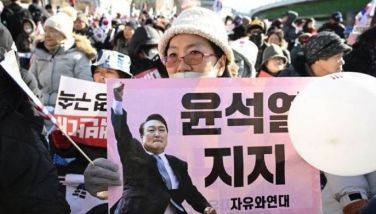Senior China leader urges island talks with Japan
BEIJING (AP) — A high-level Chinese official has called for talks with Japan over a disputed island chain, in an apparent attempt by Beijing to cool tensions that have seen both sides scramble jet fighters to the area in recent days.
Jia Qinglin, the head of China's top political advisory body, made the gesture at a meeting in Beijing with former Japanese Prime Minister Yukio Hatoyama, the official China Daily newspaper reported Thursday.
Japan has steadfastly refused China's past calls to hold talks over the islands, with Tokyo arguing that it holds sovereignty over the islets and thus there is nothing to negotiate.
Jia is believed to be the highest-ranking Chinese official to publicly issue such a call, and the mild tenor of his remarks — omitting China's standard accusation that Japan is wholly responsible for the frictions — was seen as a signal Beijing hopes to arrest momentum toward an all-out crisis.
"The two sides should appropriately handle questions surrounding the Diaoyu islands and other and other issues on which their stances' differ," Jia said, using the Chinese term for the tiny uninhabited islands lying north of Taiwan. Japan, which controls the islands, calls them the Senkakus.
Jia is due to retire in March and Hatoyama has long been an advocate of closer ties with China, though he has lost influence under new Japanese Prime Minister Shinzo Abe. China's call for talks in a meeting Wednesday could represent a way to ask for talks that is less risky than an official, high-level exchange.
However, Japan showed no sign of budging from its position.
Responding to reports that Hatoyama had agreed with Jia on the need for negotiations, Japan's chief Cabinet spokesman Yoshihide Suga expressed the Abe government's disapproval. "This is clearly not a comment that reflects the position of the Japanese government and we very much regret that someone who was once the prime minister of our country would make such remarks," Suga told reporters in Tokyo.
Feng Wei, a researcher at Fudan University's Japanese Studies Center in Shanghai, said that Jia represents "the official stance, which is to ease tensions."
"That's also why he (Hatoyama) was invited to China in the first place. It's highly symbolic."
Also Thursday, Kurt Campbell, the top U.S. diplomat for East Asia, called for "quiet diplomacy" between Japan, China and South Korea over territorial disputes in northeast Asia, but said Washington would not play the role of mediator.
The islands are surrounded by rich fishing grounds and a potential wealth of gas, oil, and other undersea resources. For China, they also mark a strategic gateway to the Pacific ocean and represent the deeply emotional legacy of Japan's conquest of Chinese territory beginning in 1895 as well as its brutal World War II occupation of much of the country.
Tensions mounted in September after Beijing responded furiously to Tokyo's purchase of the islands from private Japanese owners. Placed under U.S. control after World War II, the islands were returned to Japan in 1972, although Beijing says they have been Chinese territory for centuries. Taiwan also claims the islands.
Japan's move to nationalize the islands sparked violent anti-Japanese rioting in China and prompted Beijing to dispatch marine surveillance ships to them on a regular basis to confront Japanese Coast Guard cutters assigned to protect the area.
That standoff has also moved to the skies. Last week, both sides dispatched fighter jets to trail each other's planes. While no contact was reported, that move underscored the potential for accidents or miscalculations sparking a clash that could draw in Japan's treaty partner the United States.
Outspoken Chinese generals have added to those fears with warnings that stepped-up Japanese actions, such as the firing of warning shots at Chinese aircraft, would be seen as acts of war.
"China doesn't actually want a military confrontation. It is using the dispatch of ships and planes as a means of putting pressure on Japan to at least admit that a dispute over the islands exist," said Zhu Feng, a security expert at Peking University's School of International Studies.
Zhu said Jia's comments to Hatoyama represent an extension of that strategy, but are unlikely to produce results as long as Abe hews to the line of refusing to acknowledge that the islands are in dispute. Further complicating matters, Abe, like new Chinese leader Xi Jinping, is still establishing himself in power and doesn't wish to be seen as weak on national security matters, Zhu said.
"Nothing will change right away since Abe is taking a hard line and is busy building up his popularity and consolidating his power," Zhu said.
- Latest
- Trending






























